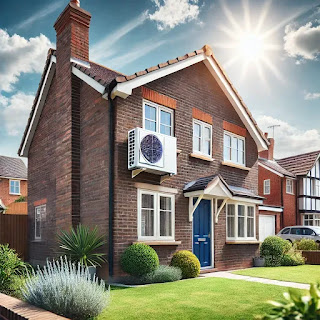Air conditioning is becoming increasingly popular in the UK as homeowners and businesses look for ways to stay cool during the hotter summer months. While traditionally seen as unnecessary due to the UK's mild climate, rising temperatures have led to a growing demand for air conditioning solutions. In this guide, we will explore the different types of air conditioning systems, their costs, benefits, and key factors to consider before installation.
Why is Air Conditioning Becoming More Popular in the UK?
In recent years, the UK has experienced record-breaking summer temperatures, making air conditioning a more attractive option for both residential and commercial properties. With improved energy efficiency and more affordable systems available, many people are now seeing air conditioning as a long-term investment for comfort and convenience.
air con installed
Types of Air Conditioning Systems
There are several types of air conditioning systems available in the UK, each catering to different needs and budgets.
1. Portable Air Conditioners
Portable units are the most affordable and flexible option for cooling a room. These systems do not require permanent installation and can be moved from one room to another.
Pros: Easy to install, no need for professional fitting, lower upfront cost
Cons: Can be noisy, less efficient for cooling larger spaces, requires venting through a window or door
Average cost: £200 - £700
2. Split Air Conditioning Systems
Split systems consist of an indoor unit mounted on the wall and an outdoor condenser unit. They provide efficient cooling and heating and are ideal for residential use.
Pros: Quiet operation, energy-efficient, provides both heating and cooling
Cons: Requires professional installation, higher initial cost
Average cost: £1,500 - £3,500 (including installation)
3. Ducted Air Conditioning Systems
Ducted systems are commonly used in larger homes or commercial buildings. They involve a network of ducts installed within walls and ceilings, distributing cool air throughout the property.
Pros: Discreet design, cools multiple rooms at once, highly efficient
Cons: Expensive installation, requires significant space for ducting
Average cost: £5,000 - £10,000
4. Window Air Conditioning Units
Window units are self-contained systems that fit into a window or a dedicated wall space. They are commonly used in flats or small office spaces.
Pros: Affordable, relatively easy to install, effective for small rooms
Cons: Can be noisy, requires a suitable window or wall opening
Average cost: £300 - £800
Benefits of Air Conditioning
Installing an air conditioning system offers numerous advantages beyond just cooling a space. Here are some key benefits:
1. Comfortable Indoor Environment
Air conditioning helps maintain a comfortable indoor temperature, especially during heatwaves, allowing you to sleep and work more effectively.
2. Improved Air Quality
Many modern air conditioning units include filters that remove dust, allergens, and pollutants, leading to cleaner indoor air.
3. Energy Efficiency
Newer models are designed to be energy-efficient, using inverter technology to adjust cooling output and reduce electricity consumption.
4. Adds Value to Property
With air conditioning becoming more desirable in the UK, installing a system can increase a property's appeal and value.
5. Dual-Function Heating and Cooling
Many systems also function as heat pumps, providing warm air in winter, making them useful year-round.
Factors Affecting the Cost of Air Conditioning
Several factors influence the cost of installing and running an air conditioning system:
Type of System: Split and ducted systems are more expensive than portable or window units.
Size of Property: Larger properties require more powerful or multiple units, increasing costs.
Installation Complexity: Professional air conditioning installation for split and ducted systems adds to the overall cost.
Energy Efficiency: Higher-rated systems may have a higher upfront cost but save money on running costs.
Maintenance and Servicing: Regular servicing is needed to keep systems running efficiently, adding to long-term costs.
Estimated Running Costs
Energy costs are an important consideration when choosing an air conditioning system. Here’s an estimate of typical running costs:
Portable AC (2.5kW): £0.20 - £0.50 per hour
Split System (3.5kW): £0.30 - £0.60 per hour
Ducted System: £0.50 - £1.00 per hour
To keep costs down, choose an energy-efficient model, ensure proper insulation, and set the thermostat to an optimal temperature (around 22-24°C in summer).
Do You Need Planning Permission for Air Conditioning?
In most cases, you do not need planning permission to install air conditioning in your home. However, if you live in a listed building or conservation area, there may be restrictions on external units. Always check with your local council if you’re unsure.
How to Get the Best Deal on Air Conditioning
Compare Quotes: Get multiple quotes from accredited installers to find the best price.
Choose an Energy-Efficient Model: Look for systems with high energy ratings to reduce running costs.
Consider Government Schemes: Some energy-efficient installations may qualify for grants or incentives.
Regular Maintenance: Keeping your system clean and well-maintained will improve efficiency and longevity.
Is Air Conditioning Right for Your Home?
If you frequently struggle with overheating in summer, suffer from allergies, or want a system that provides both heating and cooling, air conditioning could be a great investment. While the upfront costs can be high, the long-term comfort and energy efficiency benefits make it worthwhile for many homeowners.
Conclusion
Air conditioning is no longer just for commercial buildings or luxury homes—it's becoming a practical solution for many UK homeowners. Whether you opt for a portable unit, a split system, or a ducted setup, understanding the different options, costs, and benefits can help you make the best choice for your home. By investing in a quality system, you can enjoy a more comfortable living environment all year round.